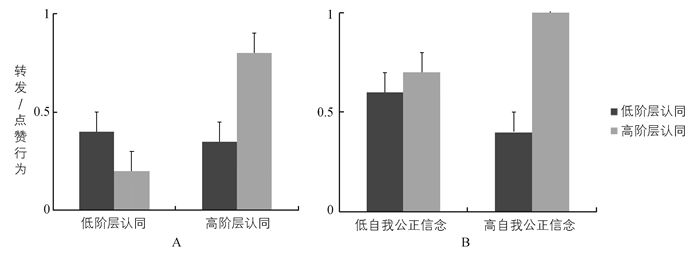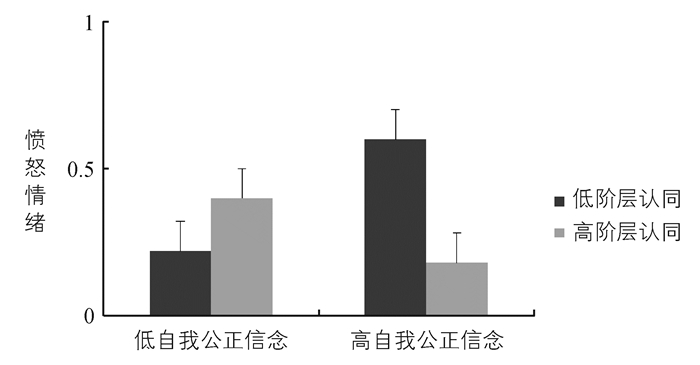全文HTML
-
网络暴力是指网民在使用互联网时表现出的暴力行为,是网民以发帖、回帖、网络创作、人肉搜索等方式展现出的暴力行为,这种行为中的人常常以道德的名义对自认为不道德或不公正的现象进行讨伐,并最终实现群体性的情绪宣泄。世界上第一起网络暴力是发生在美国的梅根事件,13岁少女梅根因不堪忍受网友的恶毒辱骂而自杀,事件导致了人们对网络暴力的关注,开始研究其本质及产生机制。关于网络暴力的性质,有人认为它与日常生活中的侵犯行为一样,并且更易于被重复[1],也有人认为网络暴力比传统暴力更复杂,不像传统暴力行为以身体攻击为主,网络暴力主要体现为社交关系上或心理上的攻击[2]。网络暴力最常见的方式有网络欺凌(cyberbullying)和网络羞辱(online shaming),前者是以强凌弱的网络暴力行为,后者则是打着维护社会正义或法律名义的网络暴力行为。研究发现24%的中国人自称遭遇过网络暴力,17%的人报告说自己曾以网络暴力的形式伤害过他人[3]。在网络世界中,人们常常是“看热闹的不怕事大”,这与传统中国文化强调“多一事不如少一事”的处事原则相违背。人们为什么会对这些和自己切身利益没有关系的事件表现出极大的热情?这种非理性的行为受什么因素的影响?对这些问题的研究离不开对当今社会群体的阶层分析。
-
依据对社会资源的拥有程度,把人们划分到不同的社会阶层中,每个人的一生都具有阶层的烙印[4]。郭永玉等人甚至用阶层固化这一新的概念来说明阶层概念在当今中国社会的表现形式[5],在他们看来,这种固化会对人的心理与行为产生深刻的影响,“富二代”“官二代”等称呼就反映了人们对阶层固化的看法。
心理学通常依据个人收入、教育程度和家庭背景等客观因素来衡量一个人的社会经济地位,并把它作为理解个体心理和行为的重要变量。我国学者陆学艺以职业分类为基础,按照组织资源、经济资源、文化资源的占有状况的划分方法[6],把中国社会划分为五种地位等级:上上层包括高层领导干部、大企业经理人员、高级专业人员及大私营企业主;中上层包括中低层领导、大企业中层管理人员、中小企业经理人员、中级专业技术人员及中等企业主;中层包括初级专业技术人员、小企业主、办事人员、个体工商户、中高技工、农业经营大户;中下层包括个体劳动者、一般商业服务业人员、工人、农民,底层包括生活处于贫困状态并缺乏就业保障的工人、农民和无业、失业、半失业者。这种划分阶层的方法把职业作为依据,在当今中国社会中具有重要的现实意义。
处在转型期的中国,由于结构性紧张带来的贫富分化是影响民众社会心理的主要因素[7],当不同的群体间出现利益冲突的时候,冲突各方常常带有“集团”或“类集团”的阶层意识,体现出强烈的阶层对立色彩。这种对立体现在三个方面:“官—民”冲突、“贫—富”冲突和“城—乡”冲突[8-9]。伴随新社会阶层的形成与利益团体的重建,人们会依据自身的身份、地位和利益状况进行站队,从而把本阶层和其他阶层所代表的立场区分开来[10],阶层意识已经成为学者们认识和理解中国社会矛盾的主要依据[11]。以常见的“仇富”或“仇官”心态为例,它与我国民众当前的主观阶层认同偏差有很大关系,与当前各社会阶层的集体意识中的对立冲突也有着不可分割的关系。
有研究发现,低社会阶层的人会更多地对社会现状产生不满[12],但也有人认为引发社会问题的根源并非人们真的处于社会底层,而是人们认为自己处于社会底层[13],这种主观认定才是社会冲突的真正导火索。所以对个人来说,自己感知到的相对社会等级才是理解个体行为的依据[14]。Adler等人的一项关于白人女性健康状况的研究表明[15],个人对自己主观社会地位的判断要比这些客观的指标更有意义。Adler等人让人们在一个10级阶梯上标出自己在社会中的社会经济地位等级[15]。结果发现一个人对自己所处社会阶层的主观定位要比那些客观的分层更有价值。本研究所采用的对主观阶层认同的评定方法,就是Adler研究中所用方法的变式,并结合了陆学艺等人对中国社会的阶层划分,采用5级的阶层划分标准,让人们在一个5级阶梯上标出自己的主观社会阶层,并以此为基础探讨网民对自己社会阶层的主观认知的影响。
-
公正世界信念(belief in a just world, BJW)是Lerner和Miller提出的概念[16],它强调人们需要相信自己所处的世界是一个公正有序的世界,在这个世界里,人们得其所应得,并且所得即应得。BJW是人类社会的一种基本信念,它能使人们相信未来的可预测性,获得安全感[17];能使个体通过使用理性或非理性的策略,对各种危机提供有意义的解释框架[18];能让人们相信世界的正义性,保障社会规范的良性运作。在测量方面,Rubin和Peplau编制的公正世界量表(Just World Scale, JWS)包含公正和不公正两个分量表[19],是一个维度的两极。后来的研究没能证明公正和不公正的单维性[20-21],研究者倾向把公正和不公正看成是两个不同的维度。比如有学者就把BJW分为自我公正世界信念与一般公正世界信念[22],前者相信世界对我来讲是公正的,后者则相信世界对其他人来说是公正的,也被称为他人公正世界信念。这种二维度结构得到了大量实证研究的支持[22-24]。本研究所用的测量工具就是Lipkusa, Dalbert和Siegler编制的公正世界信念量表。
以往研究显示,社会阶层意识与挫折感、相对剥夺感、社会不公正感密切相关。郭永玉和周春燕强调人们所处的社会阶层会决定公正世界信念水平[25],低阶层更容易依赖情境信息做出自己的判断,当其持有高公正世界信念时,更倾向于认为不佳处境是理所当然的。而对自己社会阶层认定越低的人,越认为社会不公平[26]。公正世界信念较高的个体在面对不公事件时,表现出更好的应激能力和心理调适水平[27]。周春燕和郭永玉发现公正世界信念在社会阶层和大学生心理健康之间起中介作用[28],对家庭社会地位较低的大学生的心理调适意义更大。公正世界信念也在社会经济地位与青少年的社会适应之间起调节作用[29],指向自我的自我公正世界信念与助人行为呈正相关,指向他人的一般公正世界信念却与对不幸群体的冷酷而严厉的社会态度呈正相关[20]。本研究试图探讨两种不同的公正世界信念对网民暴力行为的影响,希望能弄清楚自我和一般公正世界信念在不同类型冲突中对网民的暴力行为的影响机制。
一. 网络暴力
二. 主观阶层
三. 公正世界信念
-
以往的研究表明,在现实生活中,生活满意度越低的个体,被剥夺感越强,可获取的正常化的利益表达渠道越少,对自我的阶层认同往往越低,参与非直接利益冲突事件的倾向越高[6]。而在虚拟的网络世界中,面对碎片化、模糊性强的网络冲突事件时,公正世界信念高的个体更可能运用策略对当前受损的信念进行补偿[30],并表现出对内群体更多的认同,因而比低公正世界信念者参与更多的网络冲突行为。与以往研究不同的是,在本研究中我们把个体的公正世界信念分为指向他人的公正信念和指向自我的公正信念,并认为指向他人的公正世界信念对网络中的非直接利益冲突的影响可能小于指向自我的公正世界信念。也就是说,个体在面对社会矛盾和冲突的时候,他如果认为对自己不公平,就会表现出更多的暴力倾向;如果他认为对他人不公平,那他未必会参与到网络暴力中去。因此,本研究以主观社会阶层为自变量,以网民对与自己利益无关的网络热点事件的反应为因变量,探讨公正世界信念在其中的调节作用。根据预实验结果,我们界定了三类非冲突事件,分别是官民冲突、贫富冲突和城乡冲突。这三类冲突是网络冲突事件中最容易引发大家关注的问题。以人们对这三类冲突处理中在情绪和行为为因变量,提出以下假设:
假设 1:主观社会阶层认同与人们处理网络冲突时的网络暴力有着密切的关系,在网络世界中个体的主观阶层认同越高,冲突所引发的负性情绪越多,对冲突事件的转发和点赞的可能性越高,进一步关注冲突事件的意愿也越高。也就是说,主观社会地位评价越高的人,对社会中出现的冲突事件的关注和参与越多,出现愤怒情绪和暴力行为的倾向越高。
假设 2:公正世界信念会调节主观阶层认同与网络暴力的关系:自我公正世界信念高的个体,主观阶层认同对网络暴力起促进作用;一般公正世界信念较高的个体,主观阶层认同对网络暴力起抑制作用。当个体认为社会对自己不公平的时候,就容易表现出暴力情绪和行为倾向;而当认为社会对他人不公平的时候,则可能抑制自己的暴力情绪和行为。
-
被试来自北京市和南京市,通过问卷星完成网上问卷调查。共回收有效问卷260份,其中男性111人,女性149人(M=29.73,SD=8.75)。被试包括从事各类职业的人:生产、运输操作人员占4.2%,相关办事人员18.5%,企业负责人、私营企业主2.7%,专业技术人员26.9%,服务人员、普通办事员22.3%,党政机关、事业单位16.2%,农、林、牧、渔、水利生产人员0.8%,个体工商户4.6%,城乡无业、失业、半失业者占3.8%。69.2%的被试对当今中国是分层社会表示赞同,86.6%的被试认可阶层冲突的存在。他们平均每天上网2~3小时,主要浏览新闻、看视频、上社交网站等。
-
主观社会阶层评定量表:采用麦克阿瑟主观社会地位(MacArthur Scale of Subjective Social Status),中的阶梯。让被试根据收入和学历等对自己所处的社会阶层打分,采用5点的里克特量表,从底层、中下层、中层、中上层到上层依次赋值“1~5”,分数越高,代表主观阶层评定程度越高。
网络冲突事件情景:以微博形式呈现的几组材料,分别反映官民冲突、贫富冲突、城乡冲突三类事件,比如在官民冲突情境中,先让被试看到一个关于官民冲突的微博,题目为“江苏官员殴打记者,称看不惯记者只帮老百姓”,微博后面还配有殴打的图片以及网友对这件事情的跟帖及评论。被试的任务是在里克特7点量表上评价浏览材料后的愤怒程度、转发/点赞倾向、以及对事态发展的关注,以及一些补充性问题,这些问题主要目的是了解被试的评价以及行为的原因。贫富冲突和城乡冲突的模式基本上和官民冲突相似,这三种冲突材料的内部一致性信度为0.69。
公正世界信念量表:Dalbert编制的公正世界信念量表(Scale of belief in a just world)[27],共包含13个项目,使用6点量表评价计分。蒋奖、王荣和张雯等对量表进行了验证性因素分析[31]。在本研究中,自我公正世界信念(PBJW)和一般公正世界信念(GBJW)的内部一致性系数分别为0.88和0.80,信度良好。
控制变量:研究控制了可能对研究结果产生影响的人口学变量,包括:性别、年龄、户口类型、家庭社会经济背景、拥有房屋的数量、政治面貌和宗教信仰等。
一. 被试
二. 研究工具
-
采用SPSS17.0进行数据分析。分析方法包括相关分析、方差分析和分层回归分析。表 1是研究中所选择的各种变量的平均数、标准差以及相关矩阵。
表 1显示:主观社会阶层认同得分与三类网络冲突行为所引发的转发/点赞行为、对事态发展的关注度呈正相关,但与事件引发的愤怒情绪相关不显著,假设1得到部分验证。公正世界信念的两个维度与三种网络冲突事件的大部分维度具有显著的相关,为进一步的回归分析提供了依据。
为了明确自我或一般公正世界信念对网民处理冲突的影响,分别是以三类网络冲突事件引发的愤怒情绪、转发/点赞行为和对事态发展的关注为因变量,主观社会阶层为自变量,自我公正世界信念和一般公正世界信念为调节变量,性别、年龄、家庭背景等为控制变量做分层回归,结果如表 2和表 3所示。表 2是以自我公正世界信念做调节变量得到的分析结果,而表 3是以一般公正世界信念做调节变量得到的分析结果。
如表 2所示,在处理冲突的时候,主观社会阶层对官民和城乡冲突引发的转发/点赞起到正向预测作用,自我公正信念对贫富冲突引发的愤怒情绪有正向预测作用。主观社会阶层与自我公正信念的交互作用在城乡和贫富冲突引发的愤怒情绪、转发/点赞行为上显著,结果部分支持了假设2。为了更为清晰地说明调节变量的作用机制,依据主观社会阶层打分和自我公正世界信念得分将被试分为高分组和低分组,平均数加一个标准差以上为高分组,平均数减一个标准差以下为低分组。交互作用的结果如图 1和图 2所示:
图 1中A表示在贫富冲突所引发的愤怒情绪上,主观社会阶层和自我公正世界信念的交互作用机制:自我公正世界信念高的人,不论他的主观社会阶层得分如何,他们的愤怒情绪始终较高;而自我公正世界信念得分低的人,在主观社会阶层得分低的时候愤怒情绪较高,主观社会阶层得分高的时候,愤怒情绪会大大下降。B则反映了在城乡冲突所引发的愤怒情绪上,自我公正世界信念高的人,随着主观社会阶层得分的提升,他们的愤怒情绪也在增强;而自我公正世界信念低的人,主观社会阶层得分的增高反而导致愤怒情绪降低。
图 2显示了以贫富和城乡冲突引发的转发/点赞行为为因变量时,自我公正世界信念和主观社会阶层的交互作用。其中A表明自我公正世界信念得分低的人,对贫富冲突事件的转发/点赞几乎不受其主观阶层得分的影响;而自我公正世界信念得分高的人,随着主观社会阶层得分的增加,其点赞/转发行为也大幅增加。B表明对自我公正世界信念得分低的人而言,主观社会阶层对城乡冲突引发的转发/点赞行为影响不大;而对自我公正世界信念高的人来说,随着主观社会阶层的提升,人们对城乡冲突引发的转发/点赞行为提高了。
表 3是以三类网络冲突事件为因变量,以主观社会阶层和他人公正世界信念为自变量,以性别、房产数等为控制变量所做的分层回归。表 3表明:把控制变量放入回归方程后,回归模型不显著,把主观社会阶层和一般公正信念加入后,我们发现一般公正世界信念影响了人们对贫富冲突的愤怒和对官民、贫富、城乡冲突的转发/点赞以及对这些事件的关注。有意义的是当主观社会阶层认同和一般公正世界信念的交互项进入回归方程后,对官民冲突类事件引发的愤怒情绪预测能力显著提高了。
图 3显示了一般公正世界信念和主观社会阶层在贫富冲突所引发的愤怒情绪上的交互作用:对一般公正世界信念低的人来说,主观社会阶层的提升将引发人们对网络贫富冲突事件的更高愤怒情绪;而对一般公正世界信念高的人来说,主观社会阶层的提高反而导致了人们愤怒情绪的降低。其结果也部分支持了假设2。
-
尽管研究结果表明主观社会阶层对情绪的影响不明显,但主观社会阶层与三类网络冲突事件引发的转发/点赞行为以及对事态发展的关注度呈现正相关部分支持了研究的假设1。也就是说,在虚拟的网络世界中,人们也是根据自己的主观社会阶层来选择自己的行为。这一结果与姚德薇等人的观点不一致[10],姚德薇认为身处弱势的群体,其相对剥夺感越是强烈,越需要通过非正常的渠道发泄情绪,以争取地位存在的合法性。本研究发现在三类网络冲突中,网民的愤怒情绪并没有受到主观社会阶层评定等的影响,而对事件的转发/点赞和关注度受到主观阶层影响。我们可以从以下几个方面提供解释:
首先,被试对主观社会阶层的界定和对自己社会地位的满意不同。对自我的社会经济地位满意度较高的个体认为自己拥有更高的话语权,更倾向于对社会上的不公正事件加以点评,打抱不平,认为自己是传播真相与维护正义的“网络大侠”[32]。所以他们更倾向通过转发、点赞或评论等方式使用自己的话语权,无论情绪是理性或非理性的。他们也更倾向持续关注事态的发展,以保证自己对信息可以即时而充分地把握,从而能够继续施展话语权,参与到事件的再次传播与评论之中。与此相对应,我们发现,在对事件进行转发/点赞的原因选择上,有超过半数的被试认为,这样的行为可以“对事件施加自己的影响”或“向别人显示自己的影响力”,这正体现了人们对话语权的渴望,希望通过展现话语权来表达自信。
其次,本研究中的主观社会阶层是一个主观变量,并不等同客观的社会阶层。本研究中原本许多属于中产阶级的人认为自己处于社会中下层。这些人素养较高,能在快速浏览的过程中抓取这些较为敏感的话题,并对网络事件进行持续性的关注。他们能够意识到事件背后所反映的本质[33],在一些主观阶层评定较高个体的补充回答中,就提到了贫富差距、分配不公、二元结构冲突、当今社会的缩影、遵章守纪、城市治理需要制度规范等关键词语,并在回答中展现出要解决实际问题的态度,例如要提高个人素质,不要盲目跟风、也可能的确存在执法问题等,更有被试表达了“需要一分为二地看问题,仇富也是嫉妒的一种表现,不患寡而患不均”这样的见解。这些人并非只是盲目地被网络事件瞬间点燃情绪,而是已经能够自行对事件展开分析。所以对于这些群体而言,转发和点赞的行为拥有更多的理性成分,行为背后的原因更多出自于“打抱不平”或“维护权益”,选择“借机发泄”的比例反而较少。
最后,这也可能与被试中真正的弱势群体的比例小,而这些人对自己的主观社会阶层评定高有关系。尽管其实际的职业、收入和受教育水平较低,但其周围的动态与静态环境均让其较为满意。莫雪芳在研究中发现,网络舆论事件在生活节奏快、竞争激烈的大城市比例最高,如北京、广州、上海[32]。被试所在生活区域内的普遍满意度和社会和谐程度也削弱了弱势群体的消极不满情绪,并没有体现出太多发泄式的网络暴力。
-
研究结果部分支持了我们关于公正信念对主观阶层影响冲突反应上存在调节作用的假设,同时也揭示了公正信念的两个维度在发挥调节作用时机制并不相同。公正世界信念的调节作用与个体在面对不公正事件时采取的策略有很大的关联。在本研究中,网络中的冲突体现出更多“打抱不平”的趋势,这一点可以用自我公正世界信念与助人行为的正相关进行解释[20],即自我公正信念高的个体倾向于运用保护性和补偿性的策略来维护该信念存在的意义。因此他们通过转发/点赞的方式来引起社会的关注,呼吁更多的人揭露黑暗势力,并对弱势群体展开帮助。
在本研究中,高自我公正世界信念个体的主观社会阶层认同得分越高,贫富冲突事件引发的愤怒情绪也越高,而低自我公正世界信念的个体,主观社会阶层认同得分越高,贫富冲突引发的愤怒情绪则更低。这表明自我公正信念在稳定情绪、降低焦虑方面能够发挥积极功能。无论主观感知到的社会地位高低、生活满意度如何,自我功能信念高的个体出现极端失控、愤怒至极的可能性都比较小。对自我公正世界信念较低的个体来说,当其主观社会阶层认同较低时,会因自身对生活现状的不满而滋生愤怒;而对于主观社会阶层认同较高的个体,由于其承认社会的不公,所以并不会同情弱者,同时对生活较为满意,并没有吐槽的欲望,故而愤怒感大幅度地降低。所以,自我公正世界信念低很可能造成高主观社会阶层群体心态上的“麻木不仁”。
自我公正世界信念与主观社会阶层的交互作用在城乡冲突引发的愤怒情绪上的作用机制与贫富冲突相同:自我公正世界信念高时,主观社会阶层认定得分越高,城乡冲突引发的愤怒情绪也高;自我公正世界信念低的个体,主观社会阶层认定越高,城乡冲突引发的愤怒情绪则降低。为什么会出现这样的差异呢?在当代中国城乡差异是一个人人都不能回避的话题,几乎渗透在网络环境的各个角落,城市繁荣与农村萧条形成了鲜明的对比,城乡差异实质上也是贫富差异,同时还带有身份和观念的差异。所以解释贫富冲突上自我公正世界信念和主观社会阶层认定的规律同样适用于城乡冲突。并且,自我公正世界信念高时,主观社会阶层导致贫富冲突类、城乡冲突类网络事件引发的转发或点赞行为都大幅度地增加,而对于自我公正信念较弱的个体而言,主观社会阶层并没有给这两类网络冲突导致的转发或点赞行为带来明显的变化。这可能是由于自我公正世界信念强的个体拥有较高的参与助人行为的倾向,从而采用了维护公平、伸张正义的策略,认为转发和点赞是能引起广泛关注、为弱势群体打抱不平的有效途径。特别当对自我的社会地位感知较高时,个体更愿意发挥其影响力。而自我公正信念较低的个体倾向认为行动不可能改变不公的现状,也就是说当个体认为世界是不公正的,那么他会更倾向于选择眼前的利益而不会做出改变[25]。
一般公正世界信念在主观社会阶层对官民冲突引发的愤怒情绪影响上起负向调节作用。一般公正世界信念低的人,认为所有人都受到不公正对待,自身也不例外。因此主观社会阶层认定越高,便预测自己可能被剥夺的资源越多,对政府产生的愤怒情绪也越高。而一般公正世界信念高的人,觉得世界上每个人的利益终将得以维护,即使遭遇不公,从长远看也会得到补偿,例如贪官最终会落马、世道仍旧清明等。这种想法一定程度上削弱了愤怒情绪,尤其对于阶层感知较高的人,更加相信终极公正的信念,从而导致愤怒感大幅降低。因此一般公正世界信念较低的个体感知到的愤怒,是一种原始愤怒的唤起,网络事件更像是个导火索,引燃了民众对官民问题累积起来的情绪。
研究中并没有出现大幅度仇官、仇富现象,正是公正世界信念从中起到了极大的作用,公正世界信念发挥着正面的信念支撑的作用[16]。这种积极的暗示推动人们对社会抱有更多的正面情感与悲悯心态,从积极的角度看待并解决当前社会存在的矛盾。也正是因为抱有公正世界的观念,人们自身的社会责任感才得以增加,倾向于理性地应对并化解冲突,而非一味宣泄。在网络环境中,如果不结合被试的内心表露,其实很难知晓其转发或点赞的动机,这可能也是导致一些网民盲目跟风的原因之一。所以在当代互联网环境的建设中应该放言,而不是处处限言,只有当网民完整地去表达态度,并拥有多方的渠道获取多元的态度时,方能深入思考,发挥出更积极的导向作用。
一. 主观社会阶层与网络世界中的冲突处理
二. 公正信念的调节作用
-
研究证实了我们事先的假设,得到了如下结论:(1)网民对自己主观社会阶层的认定和他在网络世界的暴力行为有着密切的关系,他们总是站在自己认定的阶层立场上对不同的社会矛盾表达愤怒情绪或者暴力行为,并且认为自己社会地位越高的人越热衷于参与网络暴力。(2)个体的公正世界信念在主观阶层认同和网络暴力行为之间起调节作用,并且不同类别的公正世界信念所起的调节作用不同:自我公正世界信念增强了人们的暴力倾向,而他人公正世界信念降低了人们的暴力行为。也就是说,一个人如果觉得世界对自己是不公平的时候,地位越高的人越喜欢参与网络暴力;而如果觉得社会对别人不公平的人,则不会对冲突事件表现出暴力参与。研究结果对我们理解虚拟世界人们的暴力表达提供了理论依据,表明即使在网络世界中,人们也是依据自己的立场和利益来处理问题,越是地位高的人,在自己的利益受到威胁时,如果觉得社会对自己不公平的话,就会积极参与并表达出暴力情绪和意愿;而他们如果觉得这个世界对别人不公平的时候,却未必会出现所谓的为民请愿。




 下载:
下载:

